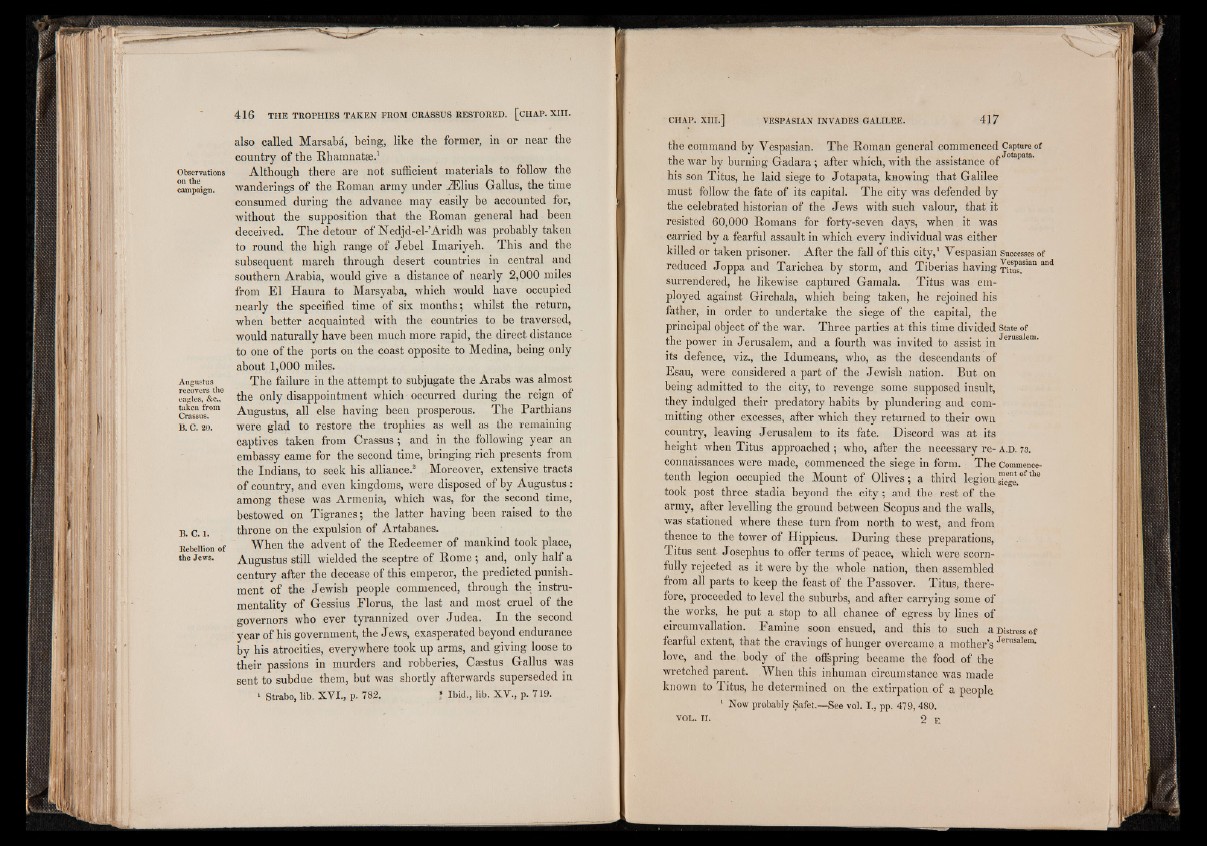
Observations
on the
campaign.
Aogustus
recovers the
eagles, &c.,
taken from
Crassus.
B. C. 20.
B. C. 1.
Rebellion of
the Jews.
also called Marsaba, being, like the former, in or near the
country of the Rhamnatee.1
Although there are not sufficient materials to follow the
wanderings of the Roman army under .ZElius Gallus, the time
consumed during the advance may easily be accounted for,
without the supposition that the Roman general had been
deceived. The detour of Nedjd-el-’Aridh was probably taken
to round the high range of Jebel Imariyeh. This and the
subsequent march through desert countries in central and
southern Arabia, would give a distance of nearly 2,000 miles
from El Haura to Marsyaba, which would have occupied
nearly the specified time of six months; whilst the return,
when better acquainted with the countries to be traversed,
would naturally have been much more rapid, the direct distance
to one of the ports on the coast opposite to Medina, being only
about 1,000 miles.
The failure in the attempt to subjugate the Arabs was almost
the only disappointment which occurred during the reign of
Augustus, all else having been prosperous. The Parthians
were glad to restore the trophies as well as the remaining
captives taken from Crassus; and in the following year an
embassy came for the second time, bringing rich presents from
the Indians, to seek his alliance.2 Moreover, extensive tracts
of country, and even kingdoms, were disposed of by Augustus :
among these was Armenia, which was, for the second time,
bestowed on Tigranes; the latter having been raised to the
throne on the expulsion of Artabanes.
When the advent of the Redeemer of mankind took place,
Augustus still wielded the sceptre of Rome ; and, only half a
century after the decease of this emperor, the predicted punishment
of the Jewish people commenced, through the instrumentality
of Gessius Floras, the last and most cruel of the
governors who ever tyrannized over Judea. In the second
year of his government, the Jews, exasperated beyond endurance
by his atrocities, everywhere took up arms, and giving loose to
their passions in murders and robberies, Csestus Gallus was
sent to subdue them, but was shortly afterwards superseded in
1 Strabo, lib. X V I., p. 782. ? Ibid., lib. X V ., p. 719.
the command by Vespasian. The Roman general commenced Capture of
the war by burning Gadara; after which, with the assistance of
his son Titus, he laid siege to Jotapata, knowing that Galilee
must follow the fate of its capital. The city was defended by
the celebrated historian of the Jews with such valour, that it
resisted 60,000 Romans for forty-seven days, when it was
carried by a fearful assault in which every individual was either
killed or taken prisoner. After the fall of this city,1 Vespasian Successes of
reduced Joppa and Tarichea by storm, and Tiberias having tuus!81*” and
surrendered, he likewise captured Gamala. Titus was employed
against Girchala, which being taken, he rejoined his
father, in order to undertake the siege of the capital, the
principal object of the war. Three parties at this time divided state of
the power in Jerusalem, and a fourth was invited to assist in erasalem-
its defence, viz., the Idumeans, who, as the descendants of
Esau, were considered a part of the Jewish nation. But on
being admitted to the city, to revenge some supposed insult,
they indulged their predatory habits by plundering and committing
other excesses, after which they returned to their own
country, leaving Jerusalem to its fate. Discord was at its
height when Titus approached ; who, after the necessary re- a .d . 73.
connaissances were made, commenced the siege in form. The Commeuce-
tenth legion occupied the Mount of Olives; a third legion™ege.°f^
took post three stadia beyond the city; and the rest of the
army, after levelling the ground between Scopus and the walls,
was stationed where these turn from north to west, and from
thence to the tower of Hippicus. During these preparations,
Titus sent Josephus to offer terms of peace, which were scornfully
rejected as it were by the whole nation, then assembled
from all parts to keep the feast of the Passover. Titus, therefore,
proceeded to level the suburbs, and after carrying some of
the works, he put a stop to all chance of egress by lines of
circumvallation. Famine soon ensued, and this to such a Distress o f
fearful extent, that the cravings of hunger overcame a mother’s Jernsalem-
love, and the body of the offspring became the food of the
wretched parent. When this inhuman circumstance was made
known to Titus, he determined on the extirpation of a people.
1 Now probably Safet.—See vol. I., pp. 479, 480.